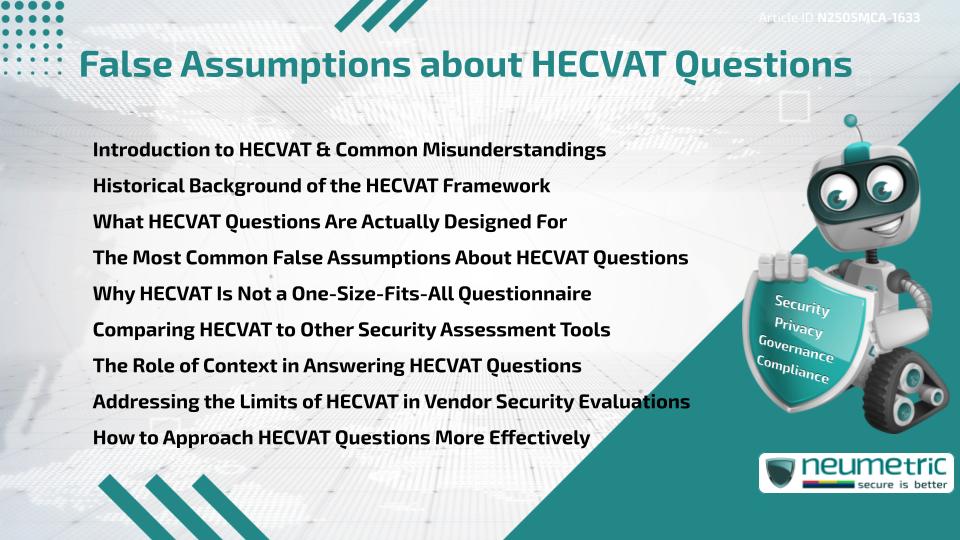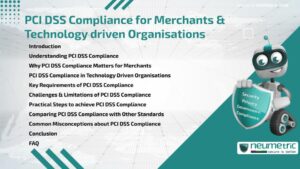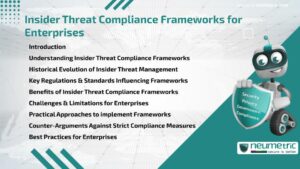Table of Contents
ToggleIntroduction to HECVAT & Common Misunderstandings
The Higher Education Community Vendor Assessment Toolkit [HECVAT] is a popular tool in higher education for assessing Third Party vendor Risk. Despite its broad adoption, many users fall into the trap of making false assumptions about HECVAT questions. These assumptions often lead to misinterpretations, incomplete responses or missed opportunities to demonstrate strong security practices.
This article explores the false assumptions about HECVAT questions, why they occur & how you can avoid them.
Historical Background of the HECVAT Framework
HECVAT was developed in 2016 by the Internet2 community, particularly aimed at simplifying the vetting process for cloud services used by colleges & universities. Its questions are aligned with established standards like NIST CSF & ISO 27001, yet are tailored for academic use cases. The Framework quickly became a baseline for ensuring Data Privacy & institutional Compliance.
Despite this history, one of the first false assumptions about HECVAT questions is that they are universally applicable across all industries. This misunderstanding leads to misalignment in expectations.
What HECVAT Questions Are Actually Designed For
HECVAT questions are designed to identify gaps in vendor security programs that could affect academic institutions. Their purpose is not to provide a rigid scoring mechanism but to open dialogue on security maturity. Yet many assume that HECVAT functions as a pass-or-fail checklist, which is not its intent.
In fact, EDUCAUSE emphasizes that HECVAT is best used as a conversation starter—not a Compliance Audit.
The Most Common False Assumptions About HECVAT Questions
Several misconceptions persist:
- That all questions must be answered with technical precision.
- That there is only one correct way to respond.
- That vague or complex questions indicate flaws in the Framework.
- That non-applicable answers indicate poor security.
These false assumptions about HECVAT questions can result in incomplete or incorrect submissions. Many vendors spend hours crafting answers they believe are perfect, when clarity & honesty would serve them better.
Why HECVAT Is Not a One-Size-Fits-All Questionnaire
HECVAT comes in multiple formats: Lite, Full & On-Prem. Each version is suited for different vendor types & service complexities. Assuming that one format suits all vendors is one of the common false assumptions about HECVAT questions.
As explained by Internet2, using the wrong version of HECVAT could lead to unnecessary confusion or oversharing of Sensitive Data.
Comparing HECVAT to Other Security Assessment Tools
HECVAT differs from other tools like SIG or CAIQ by being more tailored for the educational sector. While SIG provides detailed control assessments & CAIQ aligns with CSA standards, HECVAT centers on protecting Student Records, academic research & institutional data.
This difference highlights another false assumption about HECVAT questions—that they provide universal Risk scores comparable to other frameworks.
The Role of Context in Answering HECVAT Questions
Context is key. Some vendors assume that every HECVAT question must be answered with exhaustive technical detail. However, context often determines the relevance & depth required. For instance, a small SaaS vendor may not have SOC 2 reports but may still offer strong Data Encryption practices.
Misunderstanding context leads to more false assumptions about HECVAT questions, such as believing that lacking certain Certifications is automatically a red flag.
Addressing the Limits of HECVAT in Vendor Security Evaluations
Like all tools, HECVAT has its limits. It doesn’t assess Business Continuity plans in-depth or test the effectiveness of Incident Response systems. Believing that HECVAT alone can validate a vendor’s overall security posture is one of the key false assumptions about HECVAT questions.
Using HECVAT alongside Penetration Testing reports, policy reviews & security attestations offers a fuller picture.
How to Approach HECVAT Questions More Effectively
- Read each question in context of your service.
- Provide examples over jargon.
- Clarify answers that could be misread.
- Use the comments section wisely.
- Match the version of HECVAT to your service type.
Avoiding the false assumptions about HECVAT questions starts with a mindset shift: from answering to impress to answering to inform.
Conclusion
Understanding the real purpose of HECVAT questions helps vendors respond with clarity, relevance & confidence. By identifying & avoiding common false assumptions, Organisations can better align their answers with institutional expectations & security realities. HECVAT works best when treated as a collaborative tool—not a bureaucratic hurdle.
Takeaways
- HECVAT is a conversation starter, not a pass-or-fail test.
- False assumptions about HECVAT questions stem from misreading intent or applying the wrong context.
- Vendors should choose the right HECVAT version for their services.
- Transparency & relevance matter more than perfection.
FAQ
What are false assumptions about HECVAT questions?
They are mistaken beliefs or misinterpretations, such as thinking HECVAT is a pass-fail test or that every question must be answered technically.
Why do people make false assumptions about HECVAT questions?
Lack of training, misunderstanding the Framework’s purpose & comparing it to other security tools can lead to wrong assumptions.
Can vendors fail a HECVAT assessment?
No. HECVAT isn’t about passing or failing. It’s about communicating your security posture clearly.
Are all HECVAT questions mandatory?
No. Some questions may not apply to all vendors. It’s acceptable to mark them as non-applicable with an explanation.
How should vendors handle unclear HECVAT questions?
Use the comments field to clarify context or note uncertainties. Over-explaining is better than under-answering.
Is HECVAT better than other security questionnaires?
It depends. HECVAT is ideal for academic settings but might not be suitable for all business contexts.
Does HECVAT assess Incident Response?
Not in depth. HECVAT touches on it, but vendors should supplement with additional documentation.
Should vendors complete HECVAT alone?
No. Input from legal, IT & Compliance teams can improve accuracy & completeness.
Are security Certifications required to complete HECVAT?
Not necessarily. You can demonstrate strong practices even without formal Certifications.
Need help?
Neumetric provides organisations the necessary help to achieve their Cybersecurity, Compliance, Governance, Privacy, Certifications & Pentesting goals.
Organisations & Businesses, specifically those which provide SaaS & AI Solutions, usually need a Cybersecurity Partner for meeting & maintaining the ongoing Security & Privacy needs & requirements of their Clients & Customers.
SOC 2, ISO 27001, ISO 42001, NIST, HIPAA, HECVAT, EU GDPR are some of the Frameworks that are served by Fusion – a centralised, automated, AI-enabled SaaS Solution created & managed by Neumetric.
Reach out to us!





